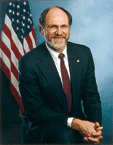 Alumni
Newsmakers
Alumni
Newsmakers
Among
the new faces-elected and appointed-inside the Beltway this past
winter were three U of C alumni whose arrivals made headlines.
 Jon
S. Corzine, MBA'73, former chair and CEO of Goldman
Sachs, made campaign history in his November race for the U.S.
Senate, spending more than $60 million on his bid for the New
Jersey seat left vacant by the retirement of fellow Democrat Frank
Lautenberg. Corzine campaigned on social issues such as universal
access to health care, tighter environmental standards, and gun
control.
Jon
S. Corzine, MBA'73, former chair and CEO of Goldman
Sachs, made campaign history in his November race for the U.S.
Senate, spending more than $60 million on his bid for the New
Jersey seat left vacant by the retirement of fellow Democrat Frank
Lautenberg. Corzine campaigned on social issues such as universal
access to health care, tighter environmental standards, and gun
control.
Joining
Goldman Sachs in 1975 as a trader, Corzine rose through the ranks
to become a general partner in 1980 and chair and CEO in 1994.
He amassed a personal fortune of $400 million while guiding the
firm to its decision to go public in 1999.
For
the Senate, Corzine's Wall Street credentials won him an appointment
to the Banking Committee, which has jurisdiction over financial
services, and the Joint Economics Committee. He also rubs elbows
with Senator Hillary Rodham Clinton (D-NY) on the Environmental
and Public Works Committee.
The
Bush administration's new deputy secretary of defense is Paul
D. Wolfowitz, PhD'72. Dean of the Paul H. Nitze School
of Advanced International Studies at Johns Hopkins University
since 1994, Wolfowitz has made a name for himself as a conservative
intellectual with hawkish views on military defense and strategy.
He
was a member of the Rumsfield commission, the panel that in 1998
warned that the U.S. was vulnerable to long-range ballistic missile
attacks by countries such as North Korea and Iraq. For the first
Bush administration, he served as undersecretary of defense for
policy, working closely with Dick Cheney, now vice president.
During the Persian Gulf War he supported Cheney's case for an
aggressive response to Iraq's invasion of Kuwait.
Under
Ronald Reagan, Wolfowitz served as the assistant secretary of
state for East Asian and Pacific affairs and later became the
U.S. ambassador to the Republic of Indonesia.
John
D. Ashcroft, JD'67,
grabbed headlines this winter when he was nominated and confirmed
as U.S. attorney general in a heated 58-to-42 Senate vote. Previously,
Ashcroft served the state of Missouri as a U.S. Senator (1994-2000),
as governor (1985-1993), and as attorney general (1976-1984).
The
nation's new attorney general takes a conservative stance on social
issues-opposing abortion except to save the life of the mother
and supporting gun control only in the form of licensing and registration.
Opponents of Ashcroft's appointment cited past actions they construed
as racist, including his opposition to Ronnie White, a black Missouri
Supreme Court justice nominated to the U.S. District Court by
President Bill Clinton. Ashcroft's detractors accused him of distorting
White's record on the bench, leading the Senate to reject White's
nomination.
During
Ashcroft's own confirmation hearings, he pledged to "enforce
the laws as written, not enforcing my own personal preference."
His first action as attorney general is to continue a study commissioned
by President Bill Clinton of racial disparities in death penalty
cases. An opponent of racial profiling, he aims to combat the
discriminatory practice by examining the types of contact between
law enforcement officials and the public.
Said
President George W. Bush of his new attorney general, "There's
no question in my mind that he will uphold and enforce the law,
[and] the civil rights laws on the books of America."-B.C.

![]()
 Alumni
Newsmakers
Alumni
Newsmakers  Jon
S. Corzine, MBA'73, former chair and CEO of Goldman
Sachs, made campaign history in his November race for the U.S.
Senate, spending more than $60 million on his bid for the New
Jersey seat left vacant by the retirement of fellow Democrat Frank
Lautenberg. Corzine campaigned on social issues such as universal
access to health care, tighter environmental standards, and gun
control.
Jon
S. Corzine, MBA'73, former chair and CEO of Goldman
Sachs, made campaign history in his November race for the U.S.
Senate, spending more than $60 million on his bid for the New
Jersey seat left vacant by the retirement of fellow Democrat Frank
Lautenberg. Corzine campaigned on social issues such as universal
access to health care, tighter environmental standards, and gun
control.